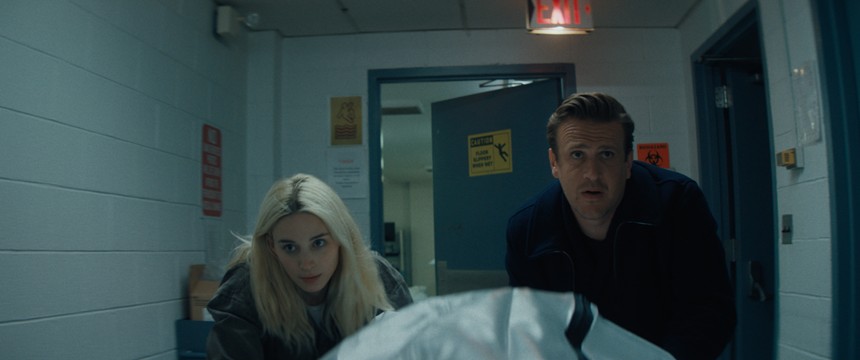Review: In THE DISCOVERY, People Are (Literally) Dying to Experience the Afterlife
Jason Segel, Rooney Mara, and Robert Redford star in Charlie McDowell's moody, twisty sci-fi tale of afterlife exploration.

… Who would fardels bear,
To grunt and sweat under a weary life,
But that the dread of something after death,
The undiscovered country, from whose bourn
No traveller returns, puzzles the will,
And makes us rather bear those ills we have
Than fly to others that we know not of?
--William Shakespeare, Hamlet
The question of what, if anything, exists beyond the realm of human existence is one that has been imagined, theorized, and speculated upon since well before Shakespeare wrote the above words in the voice of his gloomy Dane, contemplating suicide in his "To be or not to be" soliloquy. Hamlet says that it is fear and lack of knowledge of "the undiscovered country" of the afterlife that makes us endure a hard life rather than end it all.
Charlie McDowell's new film The Discovery, now out on Netflix after its premiere at Sundance this year, explores what would happen if its was scientifically proven that an afterlife indeed exists. The scientist who makes the titular finding is Dr. Thomas Harbor (Robert Redford), whose neuroscience research has led to him discovering that recordable energy leaves the body after death, proving that there is some sort of existence beyond the span of human life.
Although this revolutionary revamping of science, philosophy, and religion makes Harbor world-famous, there is an unfortunate side effect to his discovery. People begin committing suicide, by the millions, to get to the afterlife quicker. The world of this film is so cold, dreary, and gloomy as to make this believable. As the film begins, the mass suicide epidemic and collective death wish of the populace have grown to such an extent that morgues can't keep up with the bodies coming through their doors, terminal cancer patients feel like they've won the lottery, and digital tickers of suicides are erected with messages urging people not to kill themselves.
Deeply disturbed by the unintended consequences of his discovery, Harbor retreats into seclusion at a remote location off the New England coast, where he continues his research far from the eyes of the general public. He conducts these activities behind the gates of a palatial manor, where he has surrounded himself with a group of acolytes/assistants/patients who had all attempted suicide, but who now have found purpose in helping Harbor with his research. There is very much a cultish vibe to all of this, given that Harbor’s followers all wear uniformed jumpsuits, and are periodically subjected to Scientology-like Q&A sessions. These assistants also include Toby (Jesse Plemons), one of Harbor’s sons.
Harbor’s other son Will (Jason Segel), Toby’s older brother, has been long estranged from his father, but he has now come to visit Harbor, ostensibly to urge his father to give up his research, given the havoc it has already wrought upon the world. However, he has also come there to rehash old familial resentment on his part that caused the estrangement, the nature of which is revealed later.
On the ferry headed to Harbor’s estate, Will meets Isla (Rooney Mara), a young woman whose prickly and sarcastic manner hides all manner of deep pain. This becomes evident when, after not expecting to see her again after their ferry ride, Will rescues her from her attempt to drown herself in the ocean as he happens to pass her by on the beach. Will then brings her along with him to stay at his father’s home.
Despite Will’s intentions to dissuade his father from continuing his afterlife research, he and Isla both get drawn into Harbor’s experiments. Harbor is now trying to build a device that will record images of what the afterlife looks like. These experiments involve stealing fresh cadavers from a local morgue, leading to a morbidly humorous grave-robbing heist scene involving Will, Isla, and Toby. This plot development culminates in a number of third act twists concerning the intertwined fates and destinies of all the main characters, and seemingly random, chance encounters that turn out to be anything but.
McDowell’s previous film The One I Love – like The Discovery written by McDowell and Justin Lader – featured a clever, trippy conceit of a married couple confronted by doppelgangers representing more improved versions of themselves. The Discovery is also built upon a clever premise, presenting its concept on a larger canvas than McDowell’s other film, yet retaining an intimate feel that carries through to its universe-bending conclusion.
However, in sharp contrast to the playful vibe of McDowell’s previous film, The Discovery is deadly somber in a way that unfortunately drains much of the vibrancy out of its heady sci-fi scenario. Also, considering that so much of the film depends on Will and Isla’s recognition of each other as soul mates destined to be together, Segel and Mara display precious little chemistry in their scenes together. Segel in particular seems somewhat miscast, his uncharacteristically serious role restraining him in a way that never comes across as fully natural. Mara exudes a chilly vibe that keeps audience sympathy at bay, despite the fact that the story revolves so much around the painful past that leads her character to a suicide attempt.
Also, the film’s scenario is so heavily expository, with many scenes of characters explaining things to one another, that it often teeters on the edge of being overly talky and dull. Still, if you’re a fan of such dystopian dramas as The Leftovers or Colony, there’s still enough of interest here that to pique your imagination and not be a total waste of your time.
The Discovery is now available on Netflix and limited theatrical release.







